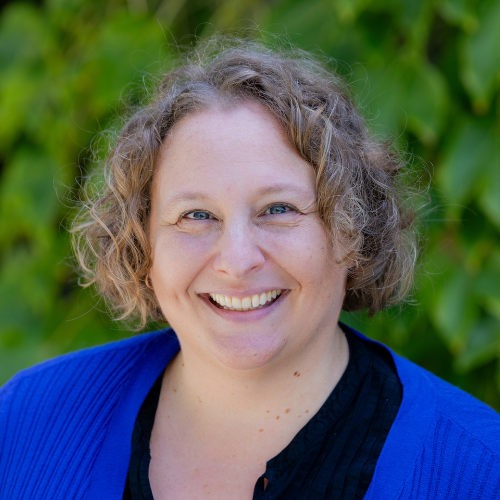This Easter sermon series explores the lectionary readings from John in Year C, focusing on some of the core characteristics that define who we are called to be as Resurrection People.
Why? On Easter Sunday, we celebrate the empty tomb with joy and wonder, giving thanks for the new life we find in the Risen Christ. Liturgically, this celebration is repeated every Sunday of the year, since Sunday worship is always a celebration of Christ’s resurrection. We gather to worship week after week because we are Resurrection People. How, then, can our lives reflect the good news of this ongoing new life?
Easter 2C: John 20:19–31
Those Who Long to See
April 27, 2025
It’s one thing to believe in the concept of resurrected life, but it is quite another thing to see it. For some of the disciples, hearing the voice of Jesus proclaim “Peace be with you!” and seeing the crucifixion scars on his hands and side were all the evidence they needed to believe and rejoice. Thomas heard the reports from his friends but needed to see for himself, and in order to see, he needed to touch.
The text tells us that Thomas was known as Didymus, or The Twin. Why is this detail included? I wonder if it may be a signal to the reader that, as a twin, Thomas knows something of deep, intimate relationship with another human being that most of us cannot understand. The physical connection between twins in the womb results in a special kind of communion with one another, even when later sometimes separated by time and space. Perhaps touching Jesus helped assure Thomas that close communion with his Lord was still real—death had not separated them.
We all long to see the hope and promise of new life in our world today. Like Thomas, it is difficult to believe in this promise unless we can see and feel it for ourselves. Fortunately, Jesus welcomes our wondering, welcomes our touch, welcomes our longing to experience a glimpse of the new life that is to come. Like the disciples, we are part of a community of faith who will continue witnessing to one another, even as we seek new ways to experience the presence of our Lord.
Easter 3C: John 21:1–19
Those Who Fish and Feed
May 4, 2025
We don’t know how long it’s been since the disciples last saw Jesus. Long enough that the drama of witnessing his death and resurrection has given way to the realities of everyday life. They’re hungry. They’re weary from the burden of grief. Fishing may tend to both these needs, especially when Jesus makes another surprise entrance.
After ensuring that their nets are full, Jesus joins the disciples for breakfast on the beach and one more teaching moment. He already knows that Peter and the others love him, but he asks the question again and again so they will come to understand what that love actually means. To love Jesus is to love Jesus’ sheep.
Living as Resurrection People does not exempt us from the need to mourn the many losses we will all endure, but it means we get up to fish even in the midst of grief and pain, and Jesus meets us there. Like Peter, we are called to follow Jesus, feeding others so that we might live the hope of the resurrection together.
Easter 4C: John 10:22–30
Those Who Follow the Shepherd
May 11, 2025
The Fourth Sunday of Easter is also known as Good Shepherd Sunday, when the lectionary always includes a reading from John 10. Year C gets the final pericope of the chapter, where Jesus does not specifically call himself the shepherd, as he has done earlier in verses 11 and 14, but instead implies this role in a discourse about the nature of his sheep. The Jews who question his messianic identity are not among his sheep because, he says, “My sheep hear my voice. I know them, and they follow me” (verse 27).
The Jewish teachings of the coming Messiah led many to envision a conquering hero—a king who could stand up to the political power of the Roman government, or of the many kings who ruled over centuries of oppression. But Jesus was never going to be the kind of king who sits at a distance wielding power. No, Jesus is a shepherd who is down in the mud sleeping with the sheep. That’s how the sheep know his voice—they recognize their protector who is always there, always directing their path.
Merely hearing the voice of the shepherd is not enough, however. Just as Jesus reminded Peter in last week’s text, we are called not only to hear but also to follow. It is all too easy to follow the bellowing noise of empire-defined voices of power, but as Resurrection People, we know that the path to new life is down in the mud, following the voice of our Good Shepherd.
Easter 5C: John 13:31–35
Those Who Answer a New Command
May 18, 2025
This text is a curious placement in the Easter season lectionary, since it is merely the summation of all that has happened in the upper room on the night Jesus washes his disciples’ feet, institutes the Lord’s Supper, and identifies Judas Iscariot as the one who will betray him. In fact, we can only begin to understand what is meant by this “new commandment” if we understand what has come before its pronouncement.
How can loving one another be a “new” commandment? The Passover festival that has brought Jesus and his disciples to this upper room is a yearly remembrance of the salvation wrought by a mighty God whose love is shown through dramatic rescue of the righteous and certain judgment of the unrighteous. Now the death and resurrection of Jesus introduce a different kind of love found in the new covenant of Christ’s blood. Our salvation comes from the one who washes feet, who breaks bread with his friends, who plays in the mud with his sheep. This is a radical reordering of power and a new covenant of love. The more we learn to answer the command to love in this way, the more we will help to realize the promise of resurrected life in our world today.
Easter 6C: John 5:1–9
Those Who Want to Be Well
May 25, 2025
The lectionary offers a choice on this Sunday between John 14:23–29 and John 5:1–9. Choosing John 14 is an opportunity to continue in Jesus’ discourse with his disciples that began last Sunday and to consider further variations on the theme of “If you love me, you will follow/feed my sheep/love one another” and now “keep my word.” Alternatively, choosing John 5 is an opportunity to look inward at what may be standing in the way of our ability to fully love/follow/feed/keep.
Jesus asks the man at the Pool of Bethesda, “Do you want to be made well?” This man has been coming to this pool day after day for, presumably, much of the 38 years of his illness, so certainly the answer is a resounding yes. His response to Jesus, however, is all the reasons he has not been able to succeed in his quest for wellness. I can relate to this posture of defensiveness because I, too, tend to believe that I am responsible for my own healing. Not only that, but I also feel responsible for my own sickness to begin with. Like this man, I drag myself back to the pool day after day, falling into the same repeated patterns, the same self-help schemes, the same “This time will be different” guarded hope in my own devices.
Fortunately for this man, and for us all, there is no condemnation from Jesus—only compassion. We are offered the blessing of healing with no strings attached, if only we are willing to pick up our mats and walk away from futile attempts at self-preservation. The rub, of course, is that healing doesn’t often come in the manner we expect. So again we may find ourselves in the mud with a shepherd instead of comfortably seated on a bejeweled throne. Receiving the healing inherent in the resurrection promise of new life means walking toward a future that is different, and so much more, than we can imagine.
Easter 7C: John 17:20–26
Those Who May Be One
June 1, 2025
This final Easter lectionary passage is an excerpt from the larger “high priestly prayer” offered by Jesus just before his arrest. It is his final intercession with God, the Father, on behalf of his disciples—both then and now. “I ask not only on behalf of these but also on behalf of those who believe in me through their word, that they may all be one” (verses 20–21). As the Father is in Christ, so Christ is in the Father, so are we also in them—unified as one divine family. (On Pentecost, next Sunday, you may wish to use the gospel text from John 14, where the Trinity is complete through “the Holy Spirit, whom the Father will send in my name.”)
The hallmarks of Resurrection People throughout this sermon series are both individual and communal. Each of us longs to see, but we do so most effectively together. Each of us is called to fish and to feed, but we do so together. Each of us must choose to follow the Shepherd, and to answer a new command, and to be made well, but we do all of those things together, as the Body of Christ. Jesus’ intercessory prayer makes this communal call abundantly clear. The resurrected life is a life of communion with the Father, the Son (and the Spirit), and with one another. May we be bold to receive the gift of living into the glory of God, in Christ Jesus.

